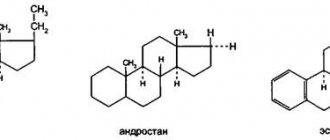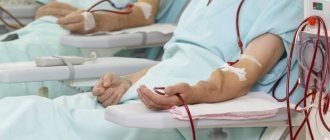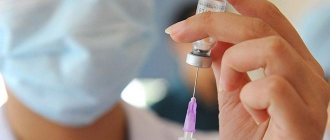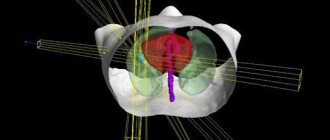With the onset of perimenopause, every woman begins to experience symptoms of this period, which appear due to a decrease in estrogen concentration.
Most often this manifests itself in increased sweating, a sharp increase in body weight, the development of arrhythmia, and the appearance of dryness of the vaginal mucosa. Some women may develop urinary incontinence. Hormonal imbalance also affects the emotional state, because the word “menopause” sounds like a death sentence for all women. But do not despair, because modern medicine offers a wide selection of hormonal drugs that help reduce symptoms or eliminate them completely.
Hormonal drugs can be divided into two categories.
- Medicines that contain estrogen. This type of medication is prescribed after removal of the uterus - hysterectomy.
- Combined hormonal drugs that include progesterone in addition to estrogen.
Hormone replacement therapy is considered the best option for getting rid of the vivid clinical picture of menopause.
Do not forget that hormone replacement therapy with new generation drugs should only be prescribed by a doctor; self-administration of these drugs can only aggravate the situation, causing a large number of side effects.
Menopause and HRT
Due to a decrease in their activity, a woman’s ovaries stop producing a sufficient amount of estrogens, which affects not only the woman’s reproductive health, but also her general well-being. The appearance of the first symptoms of menopause occurs long before the onset of menopause. In addition to the above symptoms, there is a decrease in libido. A small percentage tolerate menopause calmly, like a normal hormonal change in the body, which does not cause any discomfort.
Most often, during menopause, hormone replacement therapy is necessary to correct the possible consequences of menopause. Menopause occurs on average at 50 years of age, however, there are early menopause (40-45) and premature menopause (up to 45). It depends on the general lifestyle: nutrition, physical activity, climate, bad habits. The genetic factor plays an important role in the onset of menopause.
You should not perceive menopause as a disease - it is another stage of life that needs to be accepted. To alleviate the general condition, gynecologists recommend the use of hormone replacement therapy, which proves to be an effective method of preventing and treating the symptoms of menopause. With the help of hormonal replacement therapy with new generation medications, it is possible to fill the deficiency of the missing secretion substances, a week after the start of treatment. Currently, there is a large selection of new generation drugs that have fewer side effects and are individually selected for each woman.
Hormone replacement therapy to help women with menopause
Treatment with hormonal drugs can help a woman cope with the unpleasant, and sometimes even painful, symptoms of menopause. It is at this time that it is necessary to support the body with the missing hormones, which with the onset of menopause cease to be produced in sufficient quantities.
The main symptoms that characterize the onset of menopause:
- irritability;
- depression;
- insomnia;
- sudden jumps in blood pressure.
At this time, the female body undergoes global hormonal changes, so not every woman tolerates the onset of menopause painlessly. Many women can only assume the onset of menopause. No special changes occur to them, and the reason for speculation may be the absence of menstruation for a long time.
As menopause approaches, there is a gradual decrease in the activity of the female reproductive glands, which in most cases can affect intimate life. During sexual intercourse, women may experience pain and bleeding. Sexual desire in women during this period may decrease due to psychological reasons rather than physical ones.
Sexologists and psychotherapists are unanimous in the opinion that regular sexual activity during menopause has no less positive effect than hormonal therapy. The only thing we should not forget is the need for contraception. There are cases where pregnancy occurs even if the interval between menstruation is long. If there is no menstruation for a year, you don’t have to use protection, since pregnancy will no longer occur. And no treatment with hormones can restore the reproductive function of women.
The timing of menopause may depend on the following factors:
- living conditions;
- field of activity;
- psychological condition;
- the presence of gynecological diseases.
To support the female body during such a difficult period for it, hormone replacement therapy (abbreviated HRT or HRT) can be prescribed.
Hormone replacement therapy (HRT) refers to treatment by taking hormonal medications. Treatment is aimed at compensating for the lack of hormones that should be produced naturally in a woman’s body. These drugs contain the hormone estrogen, which is supposed to be produced by the ovaries, as well as artificial analogues of the hormone progesterone - progestogens.
Today, HRT is the most effective technique used as a treatment for various climatic disorders in women. Considering that the deterioration of women's health and disorders of the reproductive system can be observed not only during menopause, HRT can also be prescribed as a treatment for ovarian dysfunction and, as a result, menstrual irregularities.
The benefits and harms of hormone therapy
Many people are afraid of taking hormones, believing that they will only worsen the situation. But prescribing hormonal therapy for menopause is an effective method that will help prevent, eliminate or reduce disorders that develop in various body systems.
The main advantages of using hormonal replacement medications:
- taking medications that contain a similar composition of female sex hormones;
- prescribing small doses that correspond to the basic level of estradiol;
- exclusion of the development of endometrial hyperplasia, thanks to combined replacement therapy with new generation drugs;
- the ability to use only drugs that contain estrogens;
- possible use of medications for preventive purposes, which will help avoid the development of osteoporosis and cardiac ischemia.
Dosage forms
Currently, various dosage forms of new generation hormonal drugs are being produced, which have a substitution effect during menopause.
In oral form these are tablets, pills and dragees. Transdermal means subcutaneous implants or injections. Also, medications can be in local form, that is, produced in the form of various gels, creams and suppositories. Each of these forms has its own pros and cons, so it is selected individually for each woman if there is a need for replacement treatment with new generation drugs.
How to choose hormonal drugs during menopause
Such remedies come in the form of tablets, dragees, patches or suppositories. They are prescribed and changed only by the doctor after examining and interviewing the woman. Hormonal medications for menopause are taken strictly according to the instructions or developed scheme. This increases the effectiveness of treatment, reduces the likelihood of side effects and the risk of complications, the most dangerous of which is oncology. Every 6 months a woman is required to visit a gynecologist to monitor therapy.
When choosing a hormonal drug, the doctor takes into account:
- woman's age;
- for what reason did menopause begin (naturally or after surgery);
- how long ago did menopausal symptoms appear, what exactly is bothering you;
- what chronic diseases does the woman have?
- whether the uterus and ovaries were removed or not;
- are there any diseases of the reproductive system;
- what are the results of honey? examinations;
- how the thyroid gland, urinary gland, and other body systems work.
- Yorkshire Terrier - description and characteristics of the breed, care and feeding at home
- Beef khashlama
- Extirpation of the uterus with appendages
Indications and contraindications for hormone replacement treatment
There are a number of reasons why hormone replacement therapy is not possible. These include:
- chronic or acute forms of hepatitis, liver cancer;
- thrombosis;
- thromboembolism;
- oncological diseases of the mammary glands;
- endometrial oncology;
- severe forms of diabetes mellitus;
- various bleeding from the genitals;
- tumors that can begin to grow from taking estrogen hormones;
- severe pathologies of the cardiovascular system.
If we talk about the indications for which hormonal drugs are prescribed, these include:
- the onset of early menopause;
- high risk of developing osteoporosis;
- pathologies of the heart and blood vessels that developed against the background of menopause;
- high risk of developing cardiovascular disease.
With the development of various heart problems that are caused by menopause, it will not be possible to avoid the use of HRT.
Reception modes
Taking phytoestrogens lasts on average two to three months; if necessary, the course can be repeated. The number of tablets you need to take per day depends on the drug chosen.
Treatment with identical hormones lasts much longer, up to 5 years. Most often, new generation hormonal drugs must be taken once a day, at a strictly designated time. The exception is Duphaston, the intake of which is increased to 2-3 times per day.
Medicines that contain synthetic estrogen are taken on average from 1 to 3 weeks every month, depending on the prescribed drug.
Preparatory stage
It is necessary to remember that if there are no complaints about deterioration in health, you should not start taking medications.
First of all, a woman should visit her gynecologist, who will prescribe a series of examinations with the help of which menopause will be established. To do this, you will need to undergo an ultrasound examination and donate blood for hormones. The thyroid gland and mammary glands are also examined. Blood pressure must be measured. The overall picture will indicate hormonal changes in the body that are just beginning or have been going on for a long period.
After this, the doctor selects the drug and technique for taking the medication. Under no circumstances should you start treatment on your own, because taking new generation drugs can cause hormonal imbalances for the worse, which will only intensify the clinical picture of menopause.
Pills of youth
Hormone replacement therapy is needed to help a woman feel as comfortable as she did before menopause. It helps maintain youth, physical fitness - and compensate for functional changes. “Hormon replacement therapy is indicated for most women who have no contraindications. But if a woman first sees a gynecologist over the age of 65, then the meaning of HRT, of course, is lost.
The age at which you start hormone replacement therapy is directly related to when your periods stop. This usually occurs between the ages of 35 and 55. Nowadays, it is quite common for women to experience early menopause, which begins at the age of 35-40 years. In this regard, it is important not to miss the first symptoms of menopause in order to start therapy on time,” says Olga Terekhina, Ph.D., obstetrician-gynecologist.
For women with diseases of the mammary glands, thromboembolism, thrombophlebitis, cancer, with a history of uterine bleeding, serious liver and kidney diseases, hormone therapy will be contraindicated - it can aggravate the course of the disease and cause dangerous consequences.
But when prescribed correctly, women who have no contraindications can receive the “bonuses” of HRT: improving metabolism, strengthening bone tissue, preventing Alzheimer’s disease, coronary heart disease, reducing the risk of early strokes and heart attacks.
“It has been noticed that women who still have menstruation (and therefore high levels of sex hormones) are less susceptible to strokes and heart attacks - this is a kind of natural protection during reproductive age. And as soon as menopause begins, a woman becomes exposed to this risk on a par with men, who experience their first strokes and heart attacks even before the age of 30,” says Olga Terekhina.
Many women worry that hormone replacement therapy may increase the risk of “female” cancers, such as breast cancer, the development of which is sometimes associated with increased estrogen levels. “There was a lot of “noise” in the media on the topic that HRT provokes breast cancer. But “after” does not mean “as a result”: in reality, everything is explained by statistical factors.
The fact is that HRT is prescribed to women exactly when their risk of breast cancer increases globally. The critical age for this disease is 50-65 years, and at this age women usually take HRT. According to statistics, for those who undergo replacement therapy, the risk of developing various types of cancer increases by no more than 0.5%. And then, most likely, this is due to more thorough screening - after all, women who receive HRT undergo serious examinations before starting treatment and undergo a control mammogram,” explains Olga Terekhina.
Use of hormone replacement therapy
Over the past 20-25 years, the use of new generation drugs in the fight against menopause has been commonplace. Every day, hormonal drugs become better, thereby reducing the negative impact on other systems. The concentration of hormones is regulated, excipients are changed, and changes are made to combination drugs.
List of premenopausal female hormone medications
The choice of new generation hormonal drugs is based on the duration of menopause, severe symptoms and the age of the patient. New generation medications are taken parenterally.
When hormone levels decrease in the body, a number of modifications occur:
- formation of “bad” cholesterol;
- violation of fat metabolism;
- weakening of the immune system.
Another form of medication that is prescribed for menopause is bioidentical hormones. They are available not only in the form of tablets, but also creams, gels, patches and suppositories. The duration of therapy can last from 3 to 5 years.
- Femoston contains the necessary estradiol and dydrogesterone, which provide psycho-emotional and autonomic therapy.
- Janine is a contraceptive, however, during menopause it helps to compensate for the lack of estrogen in the body, which alleviates symptoms.
- Duphaston is a progesterone derivative, the administration of which helps a woman avoid the development of cancer. The drug is taken exclusively according to an individual regimen, which is selected by the doctor.
In addition, women may be prescribed synthetic estrogens.
- Klimonorm not only restores the lack of estrogen, but also has a therapeutic effect on the mucous membranes of the genitourinary system.
- Premarin suppresses the overall clinical picture of menopause and helps avoid the development of osteoporosis.
- Ovestin helps restore the vaginal epithelium and increases the resistance of the genitourinary system to various inflammatory processes.
Thus, prescribing hormone replacement therapy with new generation drugs for menopause is an excellent way to help your body during the period of hormonal menopausal changes.
Phytohormones
In order to avoid these problems, many patients are prescribed phytohormones. They do not affect hormonal levels, but can reduce the clinical picture of menopause. Representatives of hormone replacement phytoestrogens include the following drugs.
- Klimadinon, the active component of which is black cohosh extract. After consuming this phytoestrogen, the intensity of hot flashes decreases and the lack of estrogen is restored.
- Femicaps is prescribed to correct the psychological state and improve the mineral and vitamin balance. The “plus” of this dietary supplement is that it contains lecithin, vitamins and primrose.
- Remens is a homeopathic remedy. It has a positive effect on the general condition of the body and eliminates the lack of estrogen.
Hormone therapy - pros and cons
The negative attitude of individual scientists and practitioners is justified by the following statements:
- the danger of interfering with the “fine” system of hormonal regulation;
- inability to develop correct treatment regimens;
- interference with the natural aging processes of the body;
- the inability to accurately dose hormones depending on the body’s needs;
- side effects of hormonal therapy in the form of the possibility of developing malignant tumors, cardiovascular diseases and vascular thrombosis;
- lack of reliable data on the effectiveness of prevention and treatment of late complications of menopause.
Mechanisms of hormonal regulation
Maintaining the constancy of the internal environment of the body and the possibility of its adequate functioning as a whole is ensured by a self-regulating hormonal system of direct and feedback. It exists between all systems, organs and tissues - the cerebral cortex, nervous system, endocrine glands, etc.
The frequency and duration of the menstrual cycle and the onset of menopause are regulated by the hypothalamic-pituitary-ovarian system. The functioning of its individual links, the main ones of which are the hypothalamic structures of the brain, is also based on the principle of direct and feedback communication between each other and with the body as a whole.
The hypothalamus constantly releases gonadotropin-releasing hormone (GnRh) in a certain pulse mode, which stimulates the synthesis and release of follicle-stimulating and luteinizing hormones (FSH and LH) by the anterior pituitary gland. Under the influence of the latter, the ovaries (mainly) produce sex hormones - estrogens, androgens and progestins (gestagens).
An increase or decrease in the level of hormones of one link, which is also influenced by both external and internal factors, correspondingly entails an increase or decrease in the concentration of hormones produced by the endocrine glands of other links, and vice versa. This is the general meaning of the forward and feedback mechanism.
Justification for the need to use HRT
Menopause is a physiological transitional stage in a woman’s life, characterized by involutive changes in the body and the extinction of the hormonal function of the reproductive system. In accordance with the classification of 1999, during the menopausal period, starting from 39-45 years and lasting until 70-75 years, there are four phases - premenopause, menopause, postmenopause and perimenopause.
The main triggering factor in the development of menopause is age-related depletion of the follicular apparatus and hormonal function of the ovaries, as well as changes in the nervous tissue of the brain, which leads to a decrease in the production of progesterone by the ovaries, and then estrogen, and to a decrease in the sensitivity of the hypothalamus to them, and therefore to a decrease GnRg synthesis.
At the same time, in accordance with the principle of the feedback mechanism, in response to this decrease in hormones in order to stimulate their production, the pituitary gland “responds” with an increase in FSH and LH. Thanks to this “stimulation” of the ovaries, the normal concentration of sex hormones in the blood is maintained, but with intense function of the pituitary gland and an increase in the content of hormones synthesized by it in the blood, which is manifested in blood tests.
However, over time, estrogen becomes insufficient for the appropriate reaction of the pituitary gland, and this compensatory mechanism is gradually depleted. All these changes lead to dysfunction of other endocrine glands, hormonal imbalance in the body with manifestation in the form of various syndromes and symptoms, the main of which are:
- climacteric syndrome, which occurs in premenopause in 37% of women, in 40% - during menopause, in 20% - 1 year after its onset and in 2% - 5 years after its onset; menopausal syndrome is manifested by a sudden feeling of hot flashes and sweating (in 50-80%), attacks of chills, psycho-emotional instability and unstable blood pressure (usually elevated), rapid heartbeat, numbness of the fingers, tingling and pain in the heart area, memory impairment and sleep disturbances , depression, headache and other symptoms;
- genitourinary disorders - decreased sexual activity, dryness of the vaginal mucosa, accompanied by burning, itching and dyspareunia, pain when urinating, urinary incontinence;
- dystrophic changes in the skin and its appendages - diffuse alopecia, dry skin and increased fragility of nails, deepening of skin wrinkles and folds;
- metabolic disorders, manifested by an increase in body weight with a decrease in appetite, fluid retention in tissues with the appearance of facial pastiness and swelling of the legs, decreased glucose tolerance, etc.
- late manifestations - a decrease in bone mineral density and the development of osteoporosis, hypertension and coronary heart disease, Alzheimer's disease, etc.
Thus, against the background of age-related changes in many women (37-70%), all phases of the menopausal period can be accompanied by one or another dominant set of pathological symptoms and syndromes of varying severity and severity. They are caused by a deficiency of sex hormones with a corresponding significant and sustained increase in the production of gonadotropic hormones of the anterior pituitary gland - luteinizing hormone (LH) and follicle-stimulating hormone (FSH).
Hormone replacement therapy for menopause, taking into account the mechanisms of its development, is a pathogenetically based method that allows one to prevent, eliminate or significantly reduce dysfunction of organs and systems and reduce the risk of developing serious diseases associated with deficiency of sex hormones.
Types of drugs
Hormone therapy for menopause is used all over the world. These are effective drugs that, when taken, artificially supplement the deficiency of estrogen and gestagen.
New generation combined hormonal drugs
Combined drugs are new drugs for menopause. They are usually dispensed in 21 tablets and increase the amount of two hormones: estrogen and progestogen. All of them are marked with a special number so that the patient can use them in a certain sequence according to these numbers. Dosages may be different for each product. They are indicated in the instructions.
New generation hormonal drugs for menopause
| Name | Active substance | Contraindications | Possible side effects |
| Klymen | Estradiol valerate and cyproterone acetate | Breast cancer, bleeding, kidney and vein diseases | Nausea, weight loss, headache, bleeding |
| Femoston | Estradiol and dydrogesterone | Breast cancer, tumors, bleeding, liver and vein diseases | Nausea, migraines, bloating, discharge, weight changes |
| Pauzogest | Norethisterone and estradiol | Tumors, vein diseases, porphyria | Bleeding, allergies, headache |
| Cliogest | Estradiol hemihydrate and norethisterone acetate | Bleeding, breast cancer, liver disease, diabetes | Nausea, allergies, headache, tachycardia |
| Angelique | Estradiol and drospirenone | Diseases of the liver, veins, hypertriglyceridemia | Bloody discharge, bloating, vomiting, allergies |
| Aktitvel | Estradiol and norethisterone | Thromboembolic disease, liver failure, diabetes mellitus, breast fibroadenoma | Painful tension in the mammary glands, swelling |
| Ovidon | Ethinyl estradiol and levonorgestrel | Cholelithiasis | Vomiting, bloating, breast engorgement |
| Klimonorm | Estradiol valerate and levonorgestrel | Vaginal bleeding, breast cancer, liver disease | Arterial thrombosis, liver diseases |
The period for taking each product is 21 days. After this, you need to take a short break (a week). Some medications are taken daily. They have a portion of the pills without hormones that should be taken as a break. These include: Cliogest, Angelique, Pauzagest, Femostol and Actitvel.
Klimonorm is an effective drug for menopause of a new generation
Doctors also recommend hormonal contraceptives such as Janine during this period. This product prevents iron deficiency anemia and contains dienogest and ethinyl estradiol. Contraindications for taking it: diseases of veins and blood vessels, migraine, smoking, diabetes, liver dysfunction. Side effects may include nausea and vomiting.
Preparations with estrogens
All drugs contain the substance estradiol, which increases the amount of estrogen in a woman’s body. There are different forms of release of funds. Estrogen gel and cream for menopause are sold with an applicator for applying them. If it is not included in the package, you should buy it separately. During menopause, these medications should be applied once a day to the stomach and lumbar region. Next, you should wait a few minutes for them to absorb.
List of gels with estrogen
| Name | Contraindications | Possible side effects |
| Estrogel | Renal failure, jaundice, Dubin-Johnson syndrome, previous strokes | Breast enlargement, migraines, allergies, weight changes |
| Menorest | Breast cancer, tumors, vein disease | Amenorrhea, breast enlargement, bleeding |
| Proginova | Thrombophlebitis, tumors, liver failure, jaundice | Edema, hepatitis, headache, thrombosis |
| Divigel | Genital disease, breast cancer | Dizziness, nausea, vomiting |
| Octodiol | Jaundice, bleeding, breast cancer | Breast enlargement, bleeding, hepatitis |
| Dermestril | Kidney and liver diseases, tumors | Swelling, vomiting, change in breast size |
The patches are used once every 7 days. You need to glue them on the buttocks or along the spine, changing the place each time. They are not afraid of water, but can come off if overheated.
List of plasters
| Name | Contraindications | Possible side effects |
| Estraderm | Leiomyoma, heart failure, liver and kidney diseases | Liver disease, chest pain |
| Estramon | Flatulence, breast swelling | Headache, depression, weight changes, allergies |
| Klimara | Breast cancer, tumors, thrombosis | Vomiting, nausea |
| Menostar | Heart and kidney diseases | Pathology of the uterus, bleeding |
You can also use subcutaneous implants, which are sewn under the skin for half a year. Their main advantage is a one-time installation, after which you can forget about them. The implants release the required amount of hormone daily to maintain normal condition.
All products with estrogens must be taken in combination with gestagens. This will prevent possible side effects. The course of treatment is selected individually.
Preparations with gestagen (progesterone)
Preparations with gestagen are prescribed together with estrogens. The duration of treatment may vary and is determined only by the doctor.
WARNING. Women with an absent uterus should not take gestagens.
They are produced in tablets, gels, and suppositories. There are also hormonal IUDs.
Female hormones in tablets
| Name | Active substance | Contraindications | Possible side effects |
| Norkolut | Progesterone | Breast cancer | Swelling, nausea, headache |
| Iprozhin | Progesterone | Acute phlebitis, breast cancer | Drowsiness, headache |
| Progesterone | Progesterone | Breast cancer, kidney failure | Dizziness, drowsiness |
| Duphaston | Dydrogesterol | Personal intolerance to the components of the drug | Headache, allergies |
| Utrozhestan | Progesterone | Thromboembolism, renal failure | Drowsiness, bleeding |
Products with gestagens are taken in cycles of 10 days. Most often tablets are prescribed, but in some cases gels or suppositories are used.
Candles and gels to eliminate menopause symptoms
| Name | Active substance | Contraindications | Possible side effects |
| Utrozhestan candles | Progesterone | Thromboembolism, renal failure | Drowsiness, bleeding |
| Progestogel gel | Progesterone | Tumors, cancer | Fever, swelling |
| Prajisan gel | Progesterone | Porphyria, thrombophlebitis | Headache, pain in the chest area |
| Crinon gel | Progesterone | Porphyria, tumors, thrombosis | Abdominal pain, drowsiness |
It is possible to install a hormonal device into the uterus; it lasts about 8 years, after which it should be replaced. Your personal doctor will be able to select the best medications for a specific case.
Plant hormones
Herbal hormones with fewer side effects are a good alternative. They are often prescribed when there are contraindications to non-herbal drugs to alleviate well-being during menopause.
Remens is a herbal product
Non-hormonal drugs recommended for menopause.
| Titles | Leave form | Active substance | Contraindications | Possible side effects |
| Klimadinon | Pills | Black cohosh rhizome extract | Various tumors | Diarrhea, weight changes |
| Estrovel | Pills | Soy isoflavone extract | Uterine fibroids | Vomiting, nausea, diarrhea |
| Bonisan | Gel and tablets | Soy isoflavone extract | Personal intolerance | Allergy |
| Qi-Klim | Pills | Black cohosh rhizome extract | Vegetative-vascular and nervous disorders | Changes in body weight |
| Climact Hel | Gel | Sanguinaria canadensis extract, Sepia officinalis extract | Liver diseases | Allergy |
| Remens | Pills | Black cohosh rhizome extract, Sanguinaria canadensis extract, Pilocarpus extract | Personal intolerance | Increased saliva production |
| Klimaksan | Capsules | Black cohosh rhizome extract | Personal intolerance | Allergy |
All of these products are dietary supplements and can achieve a noticeable effect only with long-term use. On average, when taken systematically for 21 days, the body of a premenopausal woman is saturated with the required amount of hormones.
It is useful to take Femiwell during menopause. This is a vitamin complex designed specifically for women during this period.












